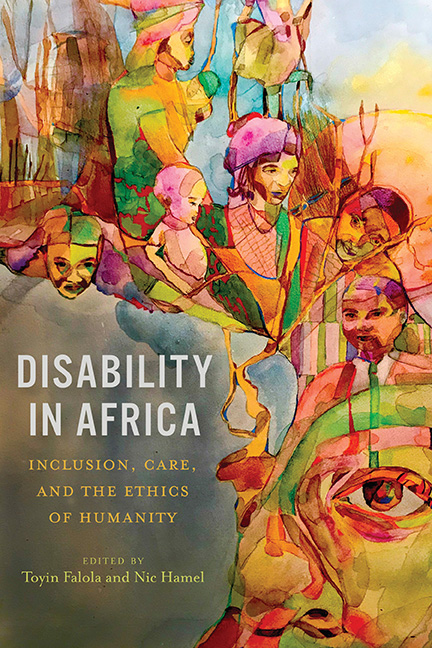Book contents
- Frontmatter
- Dedication
- Contents
- Part One Introducing the Field
- Part Two Theorizing Disability in Africa
- Part Three Representation and Cultural Expressions
- Part Four Education, Community, and Caregiving
- Part Five Activism and Barriers to Inclusion
- Conclusion: A Research Agenda for African Disability Studies
- Selected Bibliography
- Notes on Contributors
- Index
4 - Rethinking African Disability Studies: From the Cultural-Deficit Model to a Socioeconomic Perspective
Published online by Cambridge University Press: 17 June 2021
- Frontmatter
- Dedication
- Contents
- Part One Introducing the Field
- Part Two Theorizing Disability in Africa
- Part Three Representation and Cultural Expressions
- Part Four Education, Community, and Caregiving
- Part Five Activism and Barriers to Inclusion
- Conclusion: A Research Agenda for African Disability Studies
- Selected Bibliography
- Notes on Contributors
- Index
Summary
Introduction
The CRPD has been met with mixed reactions. While the framing of disability rights through human rights discourse has been universally applauded, questions have been raised about its enforceability in middle- to low-income countries. Equally uncertain has been the role of the social model of disability, which was the philosophical underpinning of the 2006 convention. Despite the social model's emancipatory ethos, its foundational premise for disability studies worldwide remains compromised by its preoccupation with postindustrial social priorities. Nowhere is this more evident than in the budding field of African disability studies, where the social model continues to cohabit with the local equivalent of the dated medical paradigm: the cultural-deficit perspective. In 2016, for example, the United Nations Department for Economic and Social Affairs (UNDESA) prepared a training manual entitled Toolkit on Disability for Africa. One of its modules, headed “Culture, Beliefs and Disability,” incorporated some discussion of the social model theory. Yet like the proverbial old wine in a new bottle, its explanation of stigma and ostracism rested primarily on cultural attitudes, saying nothing of the role of socioeconomic structure through which such collective beliefs were produced and perpetuated. The cultural-pathology approach is built on two assumptions. First, disability is a by-product of backward beliefs and harmful traditional practices. Second, such disabling environments can be reversed through modernization, secularism, and disability-awareness education. The flaws in this prognosis, in some ways reminiscent of the nineteenth- century civilizing mission, are too many to enumerate. African belief systems, unlike the major world religions, are infinite and unscripted. For every cherrypicked anecdote of a greater humanistic insight, one can cite a counterexample of overwrought ableism and outright rejection. On this ground alone, the cultural paradigm lacks universal articulation, privileging local distinctiveness over broader patterns or trends. Likewise, preoccupation with the role of the supernatural or the maleficent, a theme so pervasive in African disability literature, reinforces the primordial view of society as simple, static, and without agency. Even when a positive practice like ubuntu is identified and hailed as a role model, without sociohistorical context its virtues become so essentialized that critics are tempted to raise the red flag of cultural racism.
- Type
- Chapter
- Information
- Disability in AfricaInclusion, Care, and the Ethics of Humanity, pp. 91 - 114Publisher: Boydell & BrewerPrint publication year: 2021



